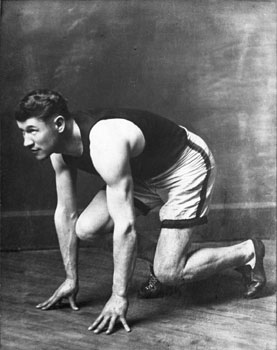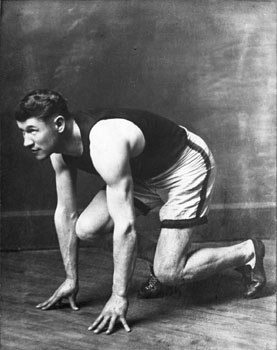Editor's Note: John Dyer is the author of From the Garden to the City, an excellent book on Christianity and technology. We are delighted to publish his reflection on Olympians and bodies.
From Embarrassment to Awe
Passing a row of large televisions at a bigbox store yesterday, I became aware that I was surrounded by images of human flesh.
Normally this would evoke one of two reactions from me. If my two small children were with me, I would be embarrassed and angry that I had exposed them to something they shouldn’t see. If I were by myself, I would probably feel shame about the battle inside me between the part that wanted to stare at the screen and the part that values holiness and purity.
But this time, I had a surprisingly different reaction.
I looked up at the screen and even though I saw a woman dressed in form-fitting, skin-revealing clothing, I didn’t feel overwhelmed with embarrassment or shame, but with awe at the stunning figure before me. I even looked rather closely at her, carefully following the line from her deliberately outstretched hands, along her lean, muscular arms, past her pulsating abdominal muscles, and down around her large, powerful thighs as she launched off the starting block, propelling herself into the water ahead of her seven competitors in the time trial.
Bodies Are Good For Something
To tell you the truth, I actually can’t remember if the first person I saw on screen was a male or female swimmer, but I used a woman in the description above because it heightens the problem of how we’ve been trained to view the human body and the reactions we have even to its description.
 Olympic athlete Jim Thorpe was of Native American (Sac and Fox) and European American ancestry. (Photo credit: Wikipedia)
Olympic athlete Jim Thorpe was of Native American (Sac and Fox) and European American ancestry. (Photo credit: Wikipedia)
In a given day, our eyes will land upon thousands of images of products and people on billboards, screens, and magazine covers. And for every 100 images that prominently display a human body, probably 99 of them do so primarily in reference to that person’s desirability, particularly their sexual desirability. According to these ads (that we see all day every day) the human body is a tool whose primary usefulness is its ability to attract other bodies for the purpose of engaging in private activities.
After all, we don’t really need the body for anything else. Work can be done on computers, things can be ordered online, and church can be streamed to a screen. Bodies are, for the most part, simply an awkward go between. When we do think about our bodies, it’s usually to find a way to give it pleasure, ease its pain, or make it look better.
Login to read more
Sign in or create a free account to access Subscriber-only content.
Topics:
